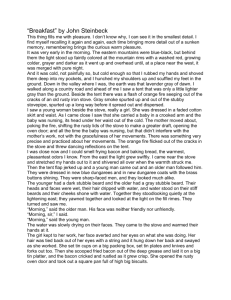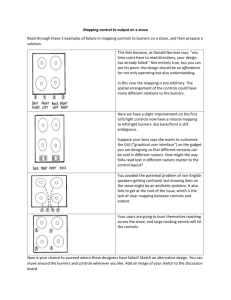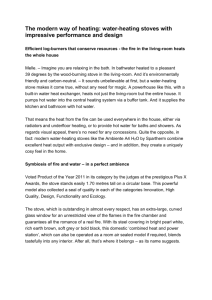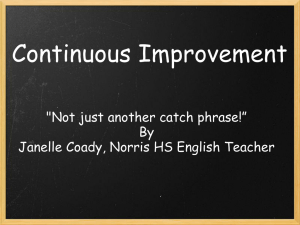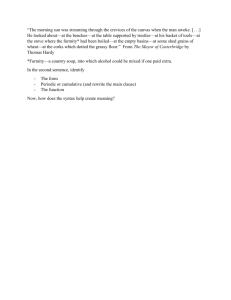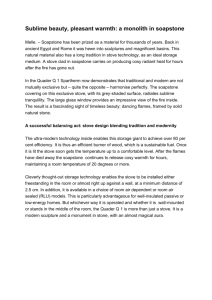“Breakfast” by John Steinbeck
advertisement
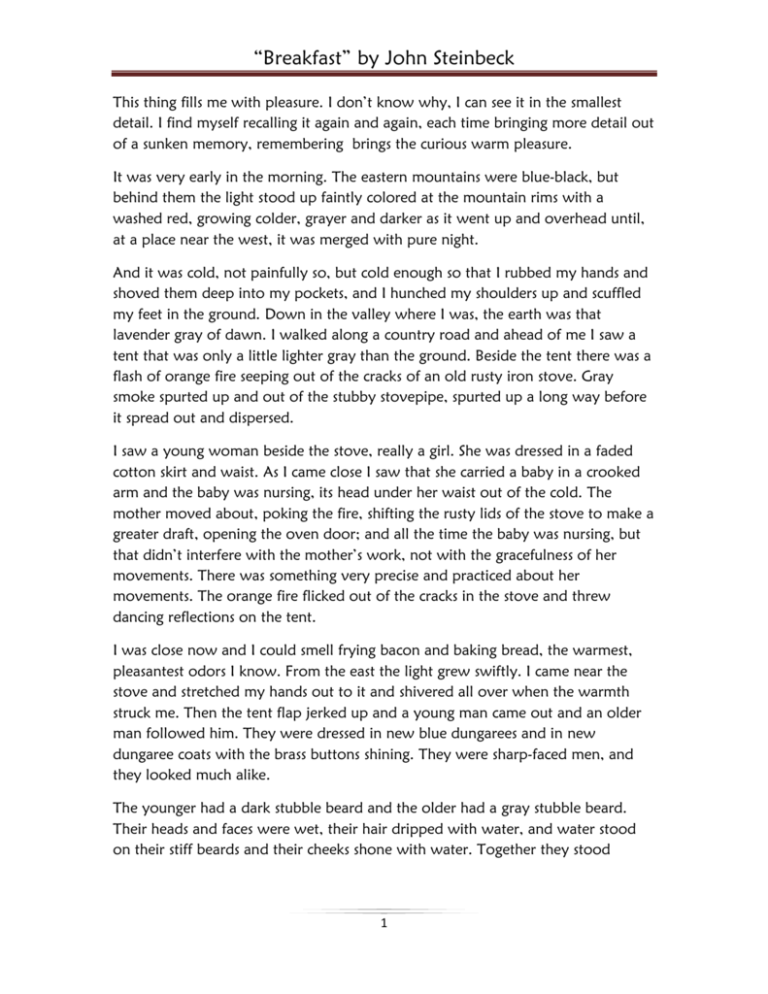
“Breakfast” by John Steinbeck This thing fills me with pleasure. I don’t know why, I can see it in the smallest detail. I find myself recalling it again and again, each time bringing more detail out of a sunken memory, remembering brings the curious warm pleasure. It was very early in the morning. The eastern mountains were blue-black, but behind them the light stood up faintly colored at the mountain rims with a washed red, growing colder, grayer and darker as it went up and overhead until, at a place near the west, it was merged with pure night. And it was cold, not painfully so, but cold enough so that I rubbed my hands and shoved them deep into my pockets, and I hunched my shoulders up and scuffled my feet in the ground. Down in the valley where I was, the earth was that lavender gray of dawn. I walked along a country road and ahead of me I saw a tent that was only a little lighter gray than the ground. Beside the tent there was a flash of orange fire seeping out of the cracks of an old rusty iron stove. Gray smoke spurted up and out of the stubby stovepipe, spurted up a long way before it spread out and dispersed. I saw a young woman beside the stove, really a girl. She was dressed in a faded cotton skirt and waist. As I came close I saw that she carried a baby in a crooked arm and the baby was nursing, its head under her waist out of the cold. The mother moved about, poking the fire, shifting the rusty lids of the stove to make a greater draft, opening the oven door; and all the time the baby was nursing, but that didn’t interfere with the mother’s work, not with the gracefulness of her movements. There was something very precise and practiced about her movements. The orange fire flicked out of the cracks in the stove and threw dancing reflections on the tent. I was close now and I could smell frying bacon and baking bread, the warmest, pleasantest odors I know. From the east the light grew swiftly. I came near the stove and stretched my hands out to it and shivered all over when the warmth struck me. Then the tent flap jerked up and a young man came out and an older man followed him. They were dressed in new blue dungarees and in new dungaree coats with the brass buttons shining. They were sharp-faced men, and they looked much alike. The younger had a dark stubble beard and the older had a gray stubble beard. Their heads and faces were wet, their hair dripped with water, and water stood on their stiff beards and their cheeks shone with water. Together they stood 1 “Breakfast” by John Steinbeck looking quietly at the lightening east; they yawned together and looked at the light on the fill rimes. They turned and saw me. “Morning,” said the older man. His face was neither friendly nor unfriendly. “Morning, sir,” I said. “Morning,” said the young man. The water was slowly drying on their faces. They came to the stove and warmed their hands at it. The girl kept to her work, her face averted and her eyes on what she was doing. Her hair was tied back out of her eyes with a string and it hung down her back and swayed as she worked. She set tin cups on a big packing box, set tin plates and knives and forks out too. Then she scooped fried bacon out of the deep grease and laid it on a big tin platter, and the bacon cricked and rustled as it grew crisp. She opened the rusty oven door and took out a square pan full of high big biscuits. When the smell of that hot bread came out, both men inhaled deeply. The elder turned to me, “Had your breakfast?” “No.” “Well, sit down with us, then.” That was the signal. We went to the packing case and squatted on the ground about it. The young man asked, “Picking cotton?” “No.” “We had twelve days’ work so far,” the young man said. The girl spoke from the stove. “They even got new clothes.” The two men looked down at their new dungarees and they both smiled a little. The girl set out the platter of bacon, the brown high biscuits, a bowl of bacon gravy and a pot of coffee, and then she squatted down by the box too. The baby was still nursing, its head up under her waist out of the cold. I could hear the sucking noises it made. 2 “Breakfast” by John Steinbeck We filled our plates, poured bacon gravy over our biscuits and sugared our coffee. The older man filled his mouth full and he chewed and chewed and swallowed. The he said, “God Almighty, it’s good;” and he filled his mouth again. The young man said, “We been eating good for twelve days.” We all ate quickly, frantically, and refilled our plated and are quickly again until we were full and warm. The hot bitter coffee scalded our throats. We threw the last little bit with the grounds in it on the earth and refilled our cups. There was color in the light now, a reddish gleam that made the air seem colder. The two men faced the east and their daces were lighted by the dawn, and I looked up for a moment and saw the image of the mountain and the light coming over it reflected in the older man’s eyes. Then the two men threw the grounds from their cups in the earth and they stood up together. “Got to get going,” the older man said. The younger man turned to me. “ ’Fyou want to pick cotton, we could maybe get you on.” “No. I got to go along. Thanks for the breakfast.” The older man waved his hand in a negative. “O.K. Glad to have you.” They walked away together. The air was blazing with light at the eastern skyline. And I walked away down the country road. That’s all. I know, of course, some of the reasons why it was pleasant. But there was some element of great beauty there that makes the rush of warmth when I think of it. 3
